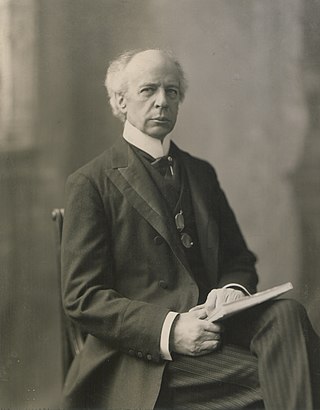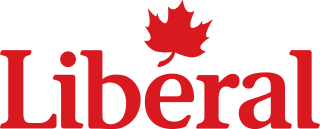
Sir Henri Charles Wilfrid Laurier, was a Canadian lawyer, statesman, and politician who served as the seventh prime minister of Canada from 1896 to 1911. The first French Canadian prime minister, his 15-year tenure remains the longest uninterrupted term of office among Canadian prime ministers and his nearly 45 years of service in the House of Commons is a record for the House. Laurier is best known for his compromises between English and French Canada.
Right-wing politics is the range of political ideologies that view certain social orders and hierarchies as inevitable, natural, normal, or desirable, typically supporting this position based on natural law, economics, authority, property, religion, biology or tradition. Hierarchy and inequality may be seen as natural results of traditional social differences or competition in market economies.

The Liberal Party of Canada is a federal political party in Canada. The party espouses the principles of liberalism, and generally sits at the centre to centre-left of the Canadian political spectrum, with their main rival, the Conservative Party, positioned to their right and the New Democratic Party positioned to their left. The party is described as "big tent", practising "brokerage politics", attracting support from a broad spectrum of voters. The Liberal Party is the longest-serving and oldest active federal political party in the country, and has dominated federal politics of Canada for much of its history, holding power for almost 70 years of the 20th century. As a result, it has sometimes been referred to as Canada's "natural governing party".

The Quebec Liberal Party is a provincial political party in Quebec. It has been independent of the federal Liberal Party of Canada since 1955. The QLP has always been associated with the colour red; each of their main opponents in different eras have been generally associated with the colour blue.

Charles Margrave Taylor is a Canadian philosopher from Montreal, Quebec, and professor emeritus at McGill University best known for his contributions to political philosophy, the philosophy of social science, the history of philosophy, and intellectual history. His work has earned him the Kyoto Prize, the Templeton Prize, the Berggruen Prize for Philosophy, and the John W. Kluge Prize.

Social liberalism is a political philosophy and variety of liberalism that endorses social justice, social services, a mixed economy, and the expansion of civil and political rights, as opposed to classical liberalism which supports unregulated laissez-faire capitalism with very few government services.
Liberalism has been a major trend in Canadian politics since the late 18th century. Canada has the same features of other liberal democracies in the Western democratic political tradition. This article gives an overview of liberalism in Canada. It includes a brief history of liberal parties with substantial representation in parliament.
Cultural conservatism is described as the protection of the cultural heritage of a nation state, or of a culture not defined by state boundaries. It is sometimes associated with criticism of multiculturalism, anti-immigration sentiment, and opposition to illegal immigration. Because their cultural preservationist objectives are in conflict with those of anti-racists, cultural conservatives are often accused of racism. Despite this, however, cultural conservatism can be more nuanced in its approach to minority languages and cultures; it is sometimes focused upon heritage language learning or threatened language revitalization, such as of the distinctive local dialect of French in Quebec, Acadian French, Canadian Gaelic, and the Mi'kmaq language in Nova Scotia and New Brunswick, or the Irish language in Newfoundland. Other times cultural conservatism is more focused upon the preservation of an ethnic minority's endangered ancestral culture, such as those of Native Americans.

Canadian nationalism seeks to promote the unity, independence, and well-being of Canada and the Canadian people. Canadian nationalism has been a significant political force since the 19th century and has typically manifested itself as seeking to advance Canada's independence from influence of the United Kingdom and the United States. Since the 1960s, most proponents of Canadian nationalism have advocated a civic nationalism due to Canada's cultural diversity that specifically has sought to equalize citizenship, especially for Québécois and French-speaking Canadians, who historically faced cultural and economic discrimination and assimilationist pressure from English Canadian-dominated governments. Canadian nationalism became an important issue during the 1988 Canadian federal election that focused on the then-proposed Canada–United States Free Trade Agreement, with Canadian nationalists opposing the agreement – saying that the agreement would lead to inevitable complete assimilation and domination of Canada by the United States. During the 1995 Quebec referendum on sovereignty that sought to determine whether Quebec would become a sovereign state or whether it would remain in Canada, Canadian nationalists and federalists supported the "no" side while Quebec nationalists largely supported the "yes" side, resulting in a razor-thin majority in favour of the "no" side that supported Quebec remaining in Canada.

Centre-right politics is the set of right-wing political ideologies that lean closer to the political centre. It is commonly associated with conservatism, Christian democracy, and conservative liberalism. Conservative and liberal centre-right parties have historically been more successful in the Anglosphere, while Christian democracy has been the primary centre-right ideology in Europe.
André Pratte is a Canadian journalist and former senator who represented the De Salaberry division in Quebec. Before being appointed to the Senate by Prime Minister Justin Trudeau on March 18, 2016, Pratte was a journalist for over 35 years and was editor-in-chief of the Montreal newspaper La Presse. He was a member of the Independent Senators Group.

Canadianism or Canadian patriotism refers to a patriotism involving cultural attachment of Canadians to Canada as their homeland. It has been identified as related, though in some cases distinct, to Canadian nationalism. In contemporary times, this patriotism has commonly emphasized Canada as a multicultural cosmopolitan society.
Liberalism is a political and moral philosophy based on the rights of the individual, liberty, consent of the governed, political equality, right to private property and equality before the law. Liberals espouse various and often mutually warring views depending on their understanding of these principles but generally support private property, market economies, individual rights, liberal democracy, secularism, rule of law, economic and political freedom, freedom of speech, freedom of the press, freedom of assembly, and freedom of religion, constitutional government and privacy rights. Liberalism is frequently cited as the dominant ideology of modern history.
This article covers the history of the Liberal Party of Canada.

The Manifesto for Walloon Culture was a document published on September 15, 1983, in Liège, Belgium. Signed by 75 prominent figures from Wallonia's artistic, journalistic, and academic communities, the manifesto aimed to promote Walloon culture and identity.
Centrism is a political outlook or position involving acceptance or support of a balance of social equality and a degree of social hierarchy while opposing political changes that would result in a significant shift of society strongly to the left or the right.
Centre-left politics is the range of left-wing political ideologies that lean closer to the political centre and broadly conform with progressivism. Ideologies of the centre-left include social democracy, social liberalism and green politics. Ideas commonly supported by the centre-left include welfare capitalism, social justice, liberal internationalism, and multiculturalism. Economically, the centre-left supports a mixed economy in a democratic capitalist system, often including economic interventionism, progressive taxation, and the right to unionize. Centre-left politics are contrasted with far-left politics that reject capitalism or advocate revolution.
Liberal socialism is a political philosophy that incorporates liberal principles to socialism. This synthesis sees liberalism as the political theory that takes the inner freedom of the human spirit as a given and adopts liberty as the goal, means and rule of shared human life. Socialism is seen as the method to realize this recognition of liberty through political and economic autonomy and emancipation from the grip of pressing material necessity. Liberal socialism opposes abolishing certain components of capitalism and supports something approximating a mixed economy that includes both social ownership and private property in capital goods.
Ethical socialism is a political philosophy that appeals to socialism on ethical and moral grounds as opposed to consumeristic, economic, and egoistic grounds. It emphasizes the need for a morally conscious economy based upon the principles of altruism, cooperation, and social justice while opposing possessive individualism.
Alain-G. Gagnon CC CQ CRC is a Montreal-based scholar who serves as President of the Royal Society of Canada and Vice-President of the International Association of Centers of Federal Studies. Since the 1980s, when he published his first major academic works, Gagnon has been an active participant in debates surrounding the constitutional status of Québec amid struggles for sovereignty and negotiations to reform Canada's federal system. He is a well established figure in the study of Québec and Canada and in the theorization of contested systems of national recognition.








